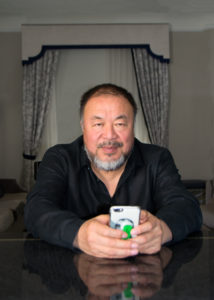
Ai Wei Wei, San Francisco, CA 10/3/17
Ai Wei Wei is an artist and an activist who has combined both his callings into pieces and protests that can both be classified as provocative. His latest film, HUMAN FLOW, is an exquisitely filmed documentary in which Ai immerses himself into the lives of people displaced by war, repressive governments, disaster both economic and ecological. In locations around the world in refugee camps that have sprung up spontaneously, to those that have been established for decades, Ai reveals the essential humanity of the residents, and finds the universal spark in them that shines in each and every one of us.
When I spoke with him on October 3, 2017, the first thing I asked him was about that curious mixture of hope and fear that migrants have when leaving their homeland, perhaps forever. We went on to talk about how migrants are dehumanized; how helping them helps ourselves; and what it is about human nature that has always feared migrants.
We went on to talk about his first instincts about making this film; how he keeps going in the face of suffering; and the power of imagery.
We finished up with Ai pondering humankind’s questionable mental state; and how editing the film turned out to be longer than shooting it all over the world
HUMAN FLOW is Ai’s powerful and elegiac documentary that uses an immersive approach, and stunningly serene cinematography, to examine the plights of migrants from around the world. At a time when there are more displaced people since World War II, Wei asks us to look into their faces, and share the variety of their experiences, from mourning loved ones drowned while fleeing, to the woman who brought her pet cat to a mother contemplating a closed border as her young daughter playfully bats a balloon in her face. Wei is an internationally renowned artist and activist, whose arrest in his native China has led him to migrate himself to Berlin.
Your Thoughts?